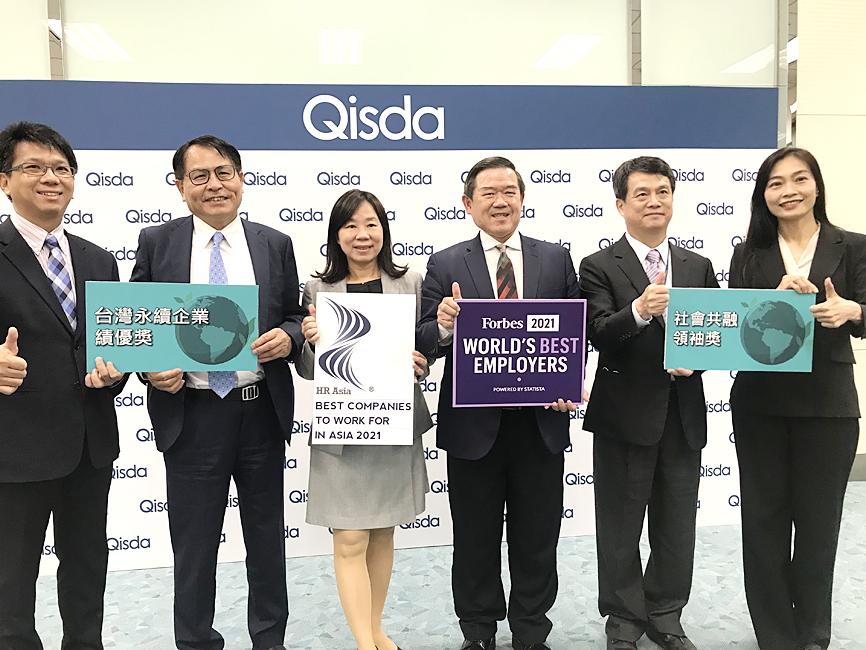Rising inflation combined with high inventory could create a painful trap for Taiwanese manufacturers, Qisda Corp (佳世達) chairman Peter Chen (陳其宏) said yesterday as the electronics manufacturer reported that consumer demand had begun to flag by the third quarter.
Consumer demand would soften in the fourth quarter, Chen said, giving a cautious outlook for Qisda, whose products include LCD monitors, projectors, networking devices, medical equipment and smart business solutions.
“The latest consumer price index from the US shows that inflation there reached 6.2 percent last month, while in Taiwan it is about 2.6 percent,” Chen told an investors’ conference in Taipei. “Prices are rising for everything — from components to street food.”

Photo: Chen Mei-ying, Taipei Times
“If consumers feel tight on money, they will not make big-ticket purchases and might even put off upgrades,” he said.
Qisda’s third-quarter profit slid 32 percent year-on-year to NT$1.4 billion (US$50.33 million).
In the first three quarters, net profit increased 127 percent to NT$7.31 billion, or earnings per share of NT$3.72, company data showed.
As many other companies reported rising revenue, but falling profit, last quarter, the situation might continue or even worsen this quarter, Chen said.
Taiwanese manufacturers might be lulled into a false sense of security, with more orders in hand than they can fulfill, he said.
However, many of those orders might turn out to be “overbooking” rather than true demand, he said.
“If a customer placed an order for 10,000 units and only received half, they might be tempted to double or even triple the order the next month and stockpile the items, but as soon as demand is satisfied, those orders would be slashed again,” Chen said.
A semiconductor shortage has left Taiwanese manufacturers with high inventories that they cannot ship because they lack one or two key components, he said.
Lower-end components, which are widely used in the automotive industry, are especially scarce, Chen said, adding that some components would remain in short supply throughout next year.
Supply chain firms in Taiwan must exercise good inventory control, he said.
“An orderly drawing down of component inventories will minimize the pain,” he said. “The fourth quarter can be a very dangerous time. Anybody sitting on too much inventory can be seriously hurt.”
Looking forward to next year, Chen said that hopefully Qisda’s non-monitor sales would overtake its monitor business.
It has been “eight years of struggle” for Qisda to diversify away from the monitor market, which he described as “a roller-coaster ride.”
High-value-added business, which includes medical, artificial intelligence of things and network equipment, accounted for 41 percent of sales in the first three quarters, he said.
“We have helped the top breakfast food chain in Taiwan cut its IT department by 80 percent,” Qisda head of business solutions Michael Lee (李昌鴻) said. “Our AI solutions help businesses prepare for inventory ahead of time, like little elves who help you do chores in the night,” Lee said.

NEW IDENTITY: Known for its software, India has expanded into hardware, with its semiconductor industry growing from US$38bn in 2023 to US$45bn to US$50bn India on Saturday inaugurated its first semiconductor assembly and test facility, a milestone in the government’s push to reduce dependence on foreign chipmakers and stake a claim in a sector dominated by China. Indian Prime Minister Narendra Modi opened US firm Micron Technology Inc’s semiconductor assembly, test and packaging unit in his home state of Gujarat, hailing the “dawn of a new era” for India’s technology ambitions. “When young Indians look back in the future, they will see this decade as the turning point in our tech future,” Modi told the event, which was broadcast on his YouTube channel. The plant would convert

‘SEISMIC SHIFT’: The researcher forecast there would be about 1.1 billion mobile shipments this year, down from 1.26 billion the prior year and erasing years of gains The global smartphone market is expected to contract 12.9 percent this year due to the unprecedented memorychip shortage, marking “a crisis like no other,” researcher International Data Corp (IDC) said. The new forecast, a dramatic revision down from earlier estimates, gives the latest accounting of the ongoing memory crunch that is affecting every corner of the electronics industry. The demand for advanced memory to power artificial intelligence (AI) tasks has drained global supply until well into next year and jeopardizes the business model of many smartphone makers. IDC forecast about 1.1 billion mobile shipments this year, down from 1.26 billion the prior

People stand in a Pokemon store in Tokyo on Thursday. One of the world highest-grossing franchises is celebrated its 30th anniversary yesterday.

Zimbabwe’s ban on raw lithium exports is forcing Chinese miners to rethink their strategy, speeding up plans to process the metal locally instead of shipping it to China’s vast rechargeable battery industry. The country is Africa’s largest lithium producer and has one of the world’s largest reserves, according to the US Geological Survey (USGS). Zimbabwe already banned the export of lithium ore in 2022 and last year announced it would halt exports of lithium concentrates from January next year. However, on Wednesday it imposed the ban with immediate effect, leaving unclear what the lithium mining sector would do in the